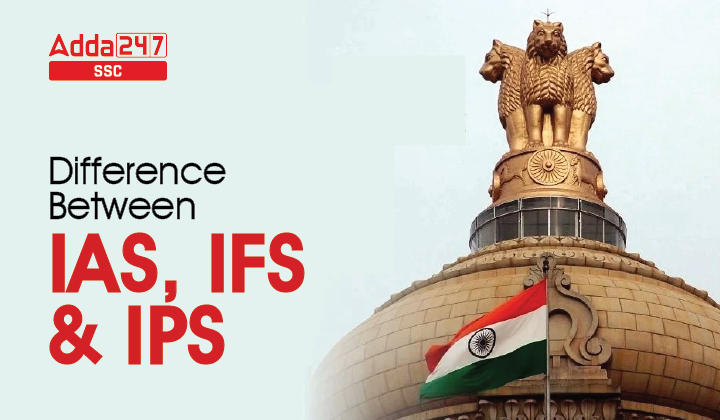Table of Contents
Difference Between IAS, IFS & IPS
Difference Between IAS, IFS & IPS: Union Public Service Commission releases the official notification for Indian Administrative Service (IAS), Indian Foreign Services (IFS), and Indian Police Services (IPS) for various vacancies on the official website. UPSC is one of the preferred career choices after graduation for young candidates because of its perks and benefits and the kind of job role. UPSC conducts the IAS, IFS, and IPS exams every year to recruit eligible candidates for all India Services and various Central Civil Services. Lakhs of students participate in the prestigious exam every year. Serving one’s nation is the most honorable job someone can have. You may serve your country in a variety of ways, but the most difficult task is to be a part of the system and then change it for the sake of the entire country. With this in mind, many people choose to enter the civil service, which requires passing the UPSC test. The field of civil services is wide. It contains several posts, each with its own set of responsibilities and power. Many students training for civil services are perplexed by the distinctions between IAS, IPS, and IFS. Here we are providing you with detailed information about IAS, IFS, and IPS services
IAS vs IFS vs IPS
IAS, IFS, and IPS are three different All India Services in India, which come under the jurisdiction of the Union (Central) Government.
- IAS (Indian Administrative Service) officers are responsible for maintaining law and order, development administration, and overall governance at the district level and above.
- IFS (Indian Forest Service) officers manage and conserve India’s forests and wildlife. They also help in environmental protection and mitigation of natural disasters.
- IPS (Indian Police Service) officers are responsible for maintaining law and order, preventing and investigating crime, and ensuring public safety.
| IAS | IFS | IPS |
| IAS stands for Indian Administrative Services. | IFS stands for Indian Foreign Services. | IPS stands for Indian Police Services. |
| IAS officers are involved in overall governance and administration. | IFS officers focus on forest and wildlife conservation. | IPS officers are responsible for law enforcement. |
| Age Limit: 21 to 32 years | Age Limit: 21 to 32 years | Age Limit: 21 to 32 years |
IAS vs IFS vs IPS Which is better?
The IFS officer salary structure is also higher than the IAS officer salary structure due to higher allowances. IAS/IPS officers, in contrast, spend their early career in district headquarters and sub-divisional towns which may be in remote areas. It’s up to the candidates what they desire and what are their aspirations according to their preferences.
IAS vs IFS vs IPS Salary
Candidates can check the IAS, IFS, and IPS salary distribution and comparison as shown below. This will help candidates to understand the difference between their salaries.
Salary of an IAS Officer
| Basic Pay(INR) | Number of years required in service | Post | |
| District Administration | |||
| 10 | 56100 | 1-4 | Sub-Divisional Magistrate |
| 11 | 67,700 | 5-8 | Additional District Magistrate |
| 12 | 78,800 | 9-12 | District Magistrate |
| 13 | 1,18,500 | 13-16 | District Magistrate |
| 14 | 1,44,200 | 16-24 | Divisional Commissioner |
| 15 | 1,82,200 | 25-30 | Divisional Commissioner |
| 16 | 2,05,400 | 30-33 | No Equivalent Rank |
| 17 | 2,25,000 | 34-36 | No Equivalent Rank |
| 18 | 2,50,000 | 37+ years | No Equivalent Rank |
IAS vs IFS vs IPS – Which is Better? Salary Difference among UPSC Posts in Hindi
Salary of an IPS Officer
| Rank | Time-Scale | Pay-Scale | Grade |
| SP | Junior Scale | ₹ 15,600 – ₹ 39,100 (Level 10 in the Pay Matrix) | ₹ 5,400 |
| Senior Scale | ₹ 15,600 – ₹ 39, 100 (Level 11 in the Pay Matrix) | ₹ 6,600 | |
| Junior Administrative Grade | ₹ 15,600 – ₹ 39, 100(Level 12 in the Pay Matrix) | ₹ 7,600 | |
| Selection Grade | ₹ 37,400 – ₹67,000 (Level 13 in the Pay Matrix) | ₹ 8,700 | |
| DIG | Super time scale | ₹ 37, 400 – ₹ 67,000 (Level 13A in the Pay Matrix) | ₹ 8,900 |
| IG | Super time scale | ₹ 37,400 – ₹ 67,000 (Level 14 in the Pay Matrix) | ₹ 10,000 |
| ADG | Above super time scale | ₹ 67, 000 – ₹ 79,000 (Level 15 in the Pay Matrix) | – |
| DG | Above super time scale | HAG ₹ 75,500 – ₹ 80,000 (Level 16 in the Pay Matrix) |
Salary of an IFS Officer
| Grade | Pay Band | Grade Pay |
| Junior scale | ₹ 15600 – ₹ 39100 | ₹5400 |
| Senior time scale | ₹ 15600 – ₹ 39100 | ₹6600 |
| Junior Administrative | ₹ 15600 – ₹ 39100 | ₹7600 |
| Selection grade | ₹37400 – ₹67000 | ₹7600 |
| Super time scale | ₹37400 – ₹67000 | ₹10000 |
| Super time scale | ₹37400 – ₹ 67000 | ₹12000 |
| Apex Pay Scale | ₹80000 | No-pay |
| Cabinet Secretary | ₹90000 | No-pay |
IAS vs IFS vs IPS: To make a Choice?
Now that you have a fundamental understanding of these postings, let’s look at who should select which posts.
Who should select IAS?
IAS is for you if you think that your ideas could revolutionize the law and improve people’s lives. You should apply for IAS if you are interested in lawmaking, its appropriate enforcement, managing the police force properly, and granting people their civil rights.
Who should make IPS decisions?
IPS is for you if you value law and order and want to see it upheld by society. You must possess courage and the capacity to command the whole police force. You cannot live in fear of terrorism or human traffickers because you must eradicate such issues. You can’t just relax and expect to keep your hands clean. You must take action in response to this post. The lives of all police officers as well as citizens will be in your hands, thus you must be both offensive and defensive.
Who ought to work as an IFS Officer?
IFS is for you if you have strong communication abilities, a voice that commands attention, and a love for your nation that you can proudly represent anywhere in the globe. In order for India to have excellent connections with other countries throughout the world, you must be able to speak with foreign ministers. You cannot avoid traveling. You need to get along well with both your own people and people from other countries. Respect for various cultures is a must, but you should also never lose sight of your own.
IAS vs IFS vs IPS: Conclusion
- Aspirants for the UPSC test sometimes have confusion when selecting the appropriate position. They frequently find themselves in the impasse between IAS, IPS, and IFS. Hopefully, this essay will help you find a solution to your predicament and give you a better understanding of the roles, duties, and authority associated with the various jobs.
- Every post has a distinctive presence in the nation, and each one enables one to serve the country and gain a great deal of respect. So, after passing the UPSC test, one can select any of the open positions if serving the country is their major priority. So being well is the most important thing to accomplish in order to fulfill this desire.
- By enrolling in one of the top online UPSC programs and receiving professional advice from your own mentor, you may advance your preparation. You may also keep an eye on this page for other useful information about UPSC test preparation that can make the process easier for you.
| Check Latest Notifications: | |
| IISER Behrampur Recruitment 2023 | Telangana High Court Recruitment 2023 |
| APSSB CHSL Recruitment 2023 | DFCCIL Recruitment 2023 |



 SSC Calendar 2025 Under Review, Revised ...
SSC Calendar 2025 Under Review, Revised ...
 Upcoming Government Exams, Complete Govt...
Upcoming Government Exams, Complete Govt...
 Govt Jobs 2025, Latest Upcoming Governme...
Govt Jobs 2025, Latest Upcoming Governme...


